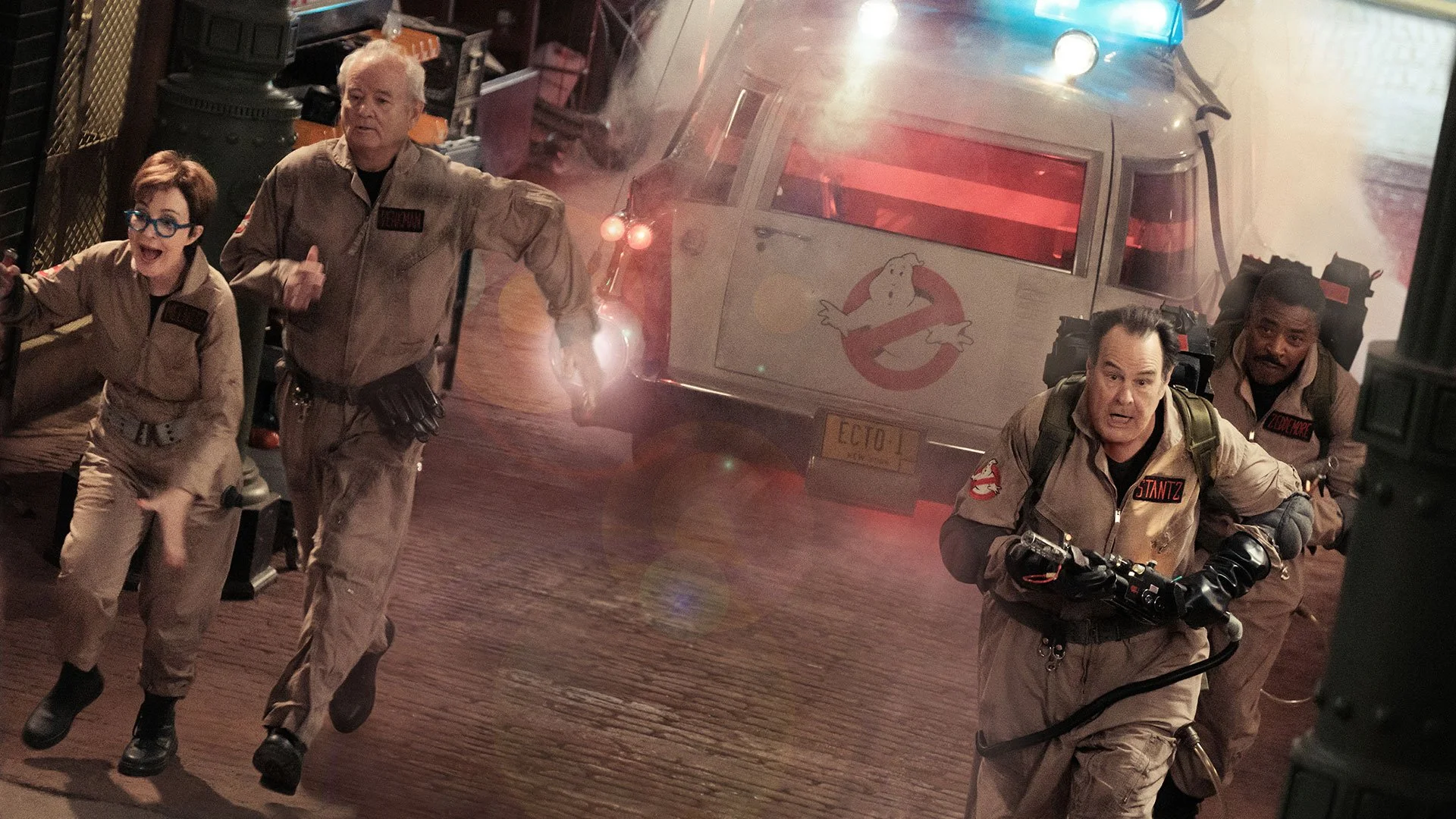Ghostbusters: Frozen Empire: An Airless Bore of a Blockbuster
If I wanted to be exceedingly catty, I would describe Ghostbusters: Frozen Empire as “We have All of Us Strangers at home.” Why? The most human part of Gil Kenan’s follow-up to Jason Reitman’s 2021 homage/nostalgia piece Ghostbusters: Afterlife is the romantically shaded friendship between a lonely creative person (Mckenna Grace’s Phoebe Spengler) and an isolated ghost trapped by her regrets and loneliness (Emily Alyn Lind’s Melody). Acknowledging that Frozen Empire and All of Us Strangers are telling very different tales and targeting VERY different audiences, the comparison still tracks for me. As timidly ambiguous as Frozen Empire’s treatment of the relationship is, it’s the only part of the picture with enough of a pulse (sorry) to discuss.
Grace and Lind’s chemistry is solid, building Phoebe and Melody into kindred spirits (sorry) drawn together not only by their need for companionship but also by their need to be understood. Phoebe, the youngest and most passionate of the Ghostbusters, longs for her drive to be recognized as a calling. Melody, stuck as a teenager for decades and separated from the family she accidentally burned to death, longs to reunite with the people she loves most—and, failing that, to have someone to care for deeply who cares for her in return.
When Frozen Empire focuses on Grace and Lind, it comes to life (sorry). Their scenes together—from their first meeting at a Central Park chess table to a pivotal sequence in the shiny new Ghostbusters lab (in a different time, it would be the basis of an incredibly elaborate playset)—are distinct, charming, melancholic, and as the stakes escalate. The big picture comes together, steadily spookier. They take Ghostbusters’ lore and expand on it (Ghostbuster and Ghost interact on peaceful, even friendly terms as peers), and at their best, thread the needle to craft eerie-in-an-all-ages-way comedy and drama. If Phoebe and Melody had been Frozen Empire’s core and the picture built on the form and mode of their story, it might have worked.
They aren’t, and it didn’t. Frozen Empire fails not because of poor technical craft or performance but because it’s hollow. The special effects and creature design are fine. The ensemble’s work is fine. The big set pieces are competently staged. But outside of Grace and Lind’s work, there’s nothing to Frozen Empire beyond reverence for the fact that Ghostbusters exists.
The sinister cryokinetic ghost who seeks to freeze himself an empire would make a good van painting. Still, the most interesting thing about him (his manipulation of other ghosts into doing his bidding with the promise of a reward) gets hucked aside so that he can growl and strut through the climax as an angry target. Dan Aykroyd and Ernie Hudson seem to be enjoying themselves, and Bill Murray Bill Murrays, but the script sticks them on pedestals to be showered with laurels for existing, rather than give them anything to do. Finn Wolfhard and Celeste O’Connor appear so infrequently that I wonder if they were working on other projects. Poor Carrie Coon and Paul Rudd have hints of a story (working out where Rudd’s Gary fits into the Spengler family) that doesn’t get the space to go anywhere beyond statements about where in that story they are at the moment.
The Ghostbusting itself is colorful and gets some new style with the introduction of a centuries-old South Asian ghostbusting tradition (which, frustratingly, mostly gets played for comedy via Kumail Nanjiani, who’s stuck playing a grating manchild), but as with Aykroyd, Hudson, Murray, and Annie Potts’ role reprisals, it’s treated with an odd, undue delicacy that undercuts both the comic and the dramatic beats. Ecto-1, for instance, is filmed like Andûril, Flame of the West, or (for a more legacyquel-esque example) K’s wooden horse not because it has meaning to or history with the players but because it’s Ecto-1. Frozen Empire cannot get too goofy with its cast and props (even when Ray goes through goofs, for instance, he’s right in the end) because Ghostbusters is the equivalent of the Sacred Jedi Texts. By the same token, there cannot be too many deviations from the status quo or change because Ghostbusters must remain intact.
The result is an airless bore of a blockbuster, so crammed full of nostalgic enshrinement that nothing gets the space to breathe except for Grace and Lind’s story, and that’s by the quality of their acting. And while Grace and Lind’s work is good, they still don’t get the space they need to make Phoebe and Melody’s tale more than a bright spot in a bad movie. If you want a ghostbusting comedy, Ghostbusters is beloved for a reason. If you want a melancholy supernatural romance, All of Us Strangers is an all-timer. If you want to see an ancient evil spirit getting got, then play the excellent horror noir shooter El Paso, Elsewhere (my favorite game—and one of my favorite pieces of pop culture—of last year). Frozen Empire’s best left to melt.




Justin Harrison is an essayist and critic based in Austin, Texas. He moved there for school and aims to stay for as long as he can afford it. Depending on the day you ask him, his favorite film is either Army of Shadows, Bring Me the Head of Alfredo Garcia, The Brothers Bloom, Green Room, or something else entirely. He’s a sucker for crime stories. His work, which includes film criticism, comics criticism, and some recent work on video games, can be found HERE.